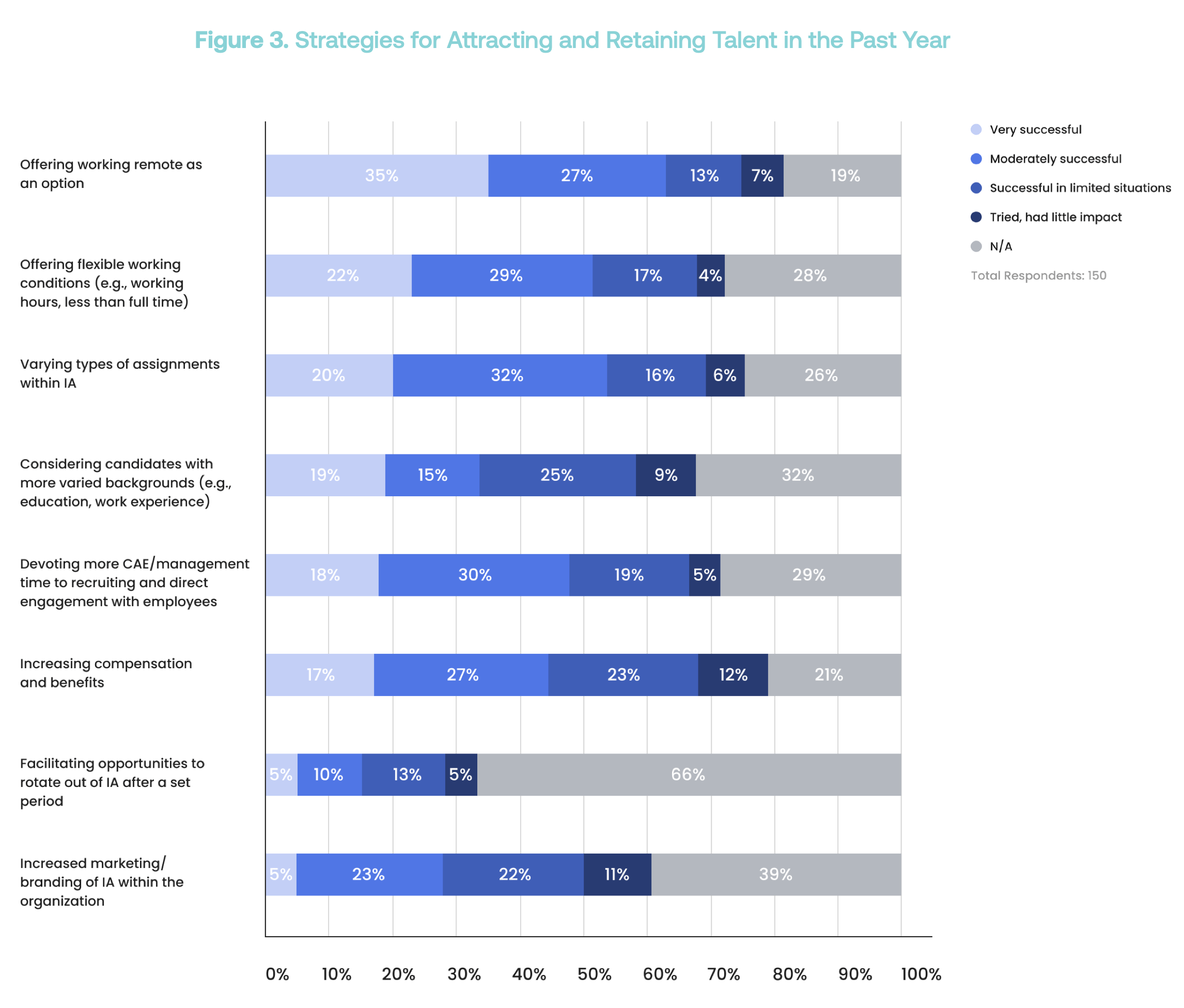
August 25, 2022 • 9 min read
Reimagining Recruiting and Retention to Build a Stronger Internal Audit Team

Richard Chambers
Welcome to the post-COVID workplace. If you want a fully staffed internal audit department composed of the best and brightest talent with the collective expertise to address the extraordinary risks facing your organization, it’s time to rethink your approach to recruiting and retention.
Internal audit is struggling to find and keep talent. In a June 2022 LinkedIn poll, more than 50% of internal audit respondents signaled that their departments have been struggling to fill vacancies for more than three months. Nearly 30% have been recruiting for more than six months. Also, the “Great Resignation” hasn’t spared internal audit. The Institute of Internal Auditors’ 2022 Pulse of Internal Audit survey found that a remarkable 46% of staff size decreases experienced during the preceding year were due to voluntary resignations.
Of course, recruiting and retention are just two pieces of a much bigger puzzle. Leading internal audit departments are focused on building out comprehensive talent management strategies. Foundational to these strategies is the understanding that workplace cultures must transform to attract and retain the talent needed to lead internal audit into the future.
As LinkedIn’s 2022 Global Talent Trends report asserts, “Company culture… is being reshaped in a crucible fired by the pandemic, the acceleration of automation, the rise of millennials and Gen Z in the workforce, and the Great Reshuffle.” The “human-centered” company culture being formed includes “flexibility, asynchrony, trust, belonging, and a holistic focus on well-being.” These characteristics are also driving how we should reimagine recruiting and retention.
Your internal audit department is no greater than the sum of its parts. It can’t be successful if it’s not stocked with tremendous talent. Today, that talent is hard to come by. The time is now to embrace the strategies that can help your department to attract and retain top talent in our transformed workplaces.
1. Reimagine Your Approach to Benefits
AuditBoard’s 2022 Mid-Year Snapshot report surveyed 170+ internal audit leaders about their most effective ways to recruit, and found that increasing compensation and benefits ranked fifth as a successful strategy for attracting and retaining talent. Internal audit leaders identified the following as more successful:
- #1 Offering remote work as an option, which 75% of respondents cited as successful.
- #2 Offering flexible working conditions (e.g., working hours, less than full time), which 68% called successful.

Millennials and Gen Zers often seek hybrid schedules balancing in-office and remote work. But workers of every generation are asking for, and receiving, the opportunity to work remotely. McKinsey’s 2022 “American Opportunity Survey” of 25,000+ US workers found that 58% of respondents had been offered the opportunity to work remotely either full-time (35%) or on a part-time or occasional basis (23%). Of respondents given the option, 87% took it. The survey also identified a “flexible working arrangement” as a top-three motivator for changing jobs.
Today’s workers tend to value quality of life above all. Historically, employers haven’t helped employees to prioritize this. You must do better to attract the best. Invest in the technologies, development strategies, and adaptive mindset that will help your department make the most of flexible and hybrid schedules. For ideas, see The Remote Auditor, a report co-authored by the Internal Audit Foundation and AuditBoard.
2. Offer More Varied Assignments
“Varying types of assignments within internal audit” was the third most successful strategy identified in AuditBoard’s survey.
Millennials and Gen Zers in particular seek rewarding work environments that fully leverage their skills. In the old model, younger auditors and those new to the profession were often expected to “put in their time,” slogging through SOX testing and other repetitive work before earning a more diversified workload. You’re not going to win over and hold onto today’s top applicants by sticking to the old model.
Commit to varying the types of assignments employees will work on. Consider a rotational program that exposes them to different areas. Keep up the variation with the team you have, both within internal audit and beyond.
3. Consider Candidates From Different Backgrounds
“Considering candidates from more varied backgrounds (e.g., education, work experience)” was the fourth most successful strategy identified by internal audit leaders.
An age-old challenge is that auditors tend to assume that the next risk will look like the last one. If we only hire candidates who we’re confident can address the risks of the past, we won’t be prepared to face the risks of the future.
Internal audit’s core foundational attributes include critical thinking, curiosity, and communication. These skills aren’t exclusive to auditors. Open the door to applicants with liberal arts or engineering backgrounds. (I’ve had several CAEs tell me that they’ve learned that engineers make great auditors.) Gartner suggests considering neurodiverse talent, who often excel in out-of-the-box problem solving and analytical thinking. Give me a strong thinker who’s a good writer and leans toward extroverted — I can teach them to audit.
4. Give More Feedback — and More of Yourself
Internal audit leaders identified “devoting more CAE/management time to recruiting and direct engagement with employees” as another strategy for success.
An aloof CAE in the corner office won’t appeal to Millennial and Gen Z workers. They want a boss they can relate to, and who will invest time in their development. They also want to feel personally invested in their team and organization. LinkedIn’s report identified both “trust” and “belonging” as central to a human-centered company culture. But we have a ways to go. A recent Gartner report shows that only 29% of workers view their leaders as authentic, empathetic, and adaptive “human leaders.”
Commit to investing more time engaging with and providing feedback to your team. Set that tone in interviews, and hold yourself accountable for following through. Also, be open to sharing more of yourself. Good leaders recognize that leadership isn’t a title; instead, it’s earned by building relationships and trust. A strong team won’t follow you because of your title, but because they are inspired.
Finally, don’t be surprised if you feel like candidates are interviewing you. Millennials and Gen Zers value information and transparency. Give it to them. After all, asking lots of good questions is one of internal audit’s core skills.
Don’t Forget the Lessons We’ve Learned
Certainly, the recruiting and retention climate may ease in times of recession. But even if hiring becomes simpler and faster over the next few months, it’s imperative that we don’t lose sight of all we’ve learned over the past few years. Even the best CAEs are nothing without a talented team backing them up. So I urge you: Reexamine any hesitations you have about embracing today’s more human-centered workplace culture. Find a path to leadership that engages, motivates, inspires, and supports. The future of our profession and the success of your internal audit department depend on it.
About the authors

Richard Chambers, CIA, CRMA, CFE, CGAP, is the CEO of Richard F. Chambers & Associates, a global advisory firm for internal audit professionals, and also serves as Senior Advisor, Risk and Audit at AuditBoard. Previously, he served for over a decade as the president and CEO of The Institute of Internal Auditors (IIA). Connect with Richard on LinkedIn.
You may also like to read


Audit reporting best practices: Guide for audit leaders

Latest data on AI adoption reinforces need for internal auditors’ “superpowers”

AuditBoard and IAF report: The more you know about AI-enabled fraud, the better equipped you are to fight it

Audit reporting best practices: Guide for audit leaders

Latest data on AI adoption reinforces need for internal auditors’ “superpowers”
Discover why industry leaders choose AuditBoard
SCHEDULE A DEMO



